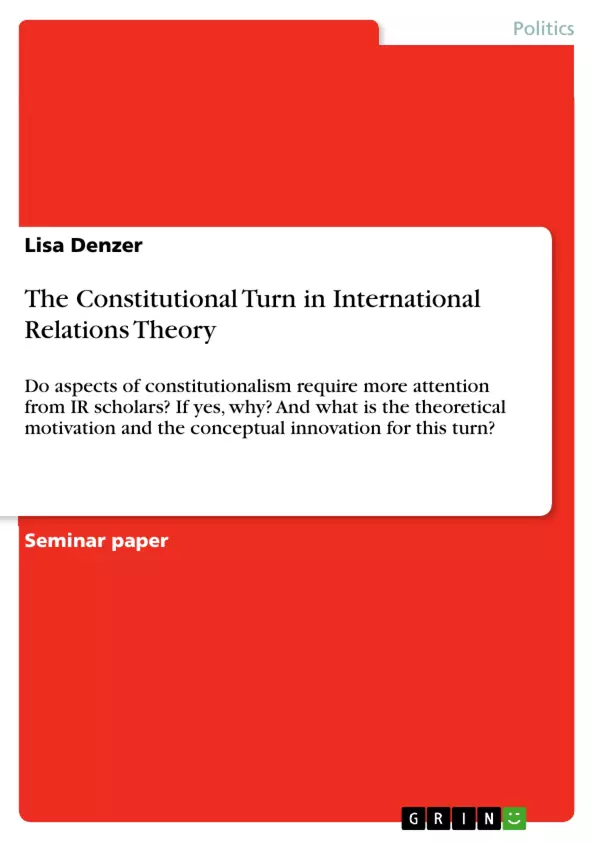The state system is and has been the main point of reference in international relations theory (from here: IR) both for traditional and new approaches (Jackson & Sörensen, 2010). Contemporary debates address the future of the state and whether its central importance in world politics may now be changing due to globaliza-tion (ibid.). The resulting emergence of a wide range of non-state actors such as international organizations caused a notable shift of power from the state to the regional or global level. The Kadi Case in 2005 and the military intervention in Libya 2011 demonstrated that e.g. the European Union and the UN now make use of this power in ways that directly affect individual’s decisions. Both cases have shown that more attention is required from IR scholars to “address the coming challenges to fundamental norms that are held as central principles in most contemporary societies among the globe” (Wiener, et al., 2012, pp. 1, 2). The recent consti-tutional turn in IR theory deals with the shift from globalization towards constitutionalisation and the perceived lack of qualitative constitutional means to bound decisions of non-state actors and ground them in normative roots demonstrating their universal validity (Wiener, et al., 2012, p. 3).
This paper will focus on the theoretical motivation and conceptual innovation of the so called constitutional turn in IR. It will further discuss the turn critically and explain why this turn requires more attention from IR scholars.
Inhaltsverzeichnis (Table of Contents)
- Introduction
- The Constitutional Turn in International Relations Theory
Zielsetzung und Themenschwerpunkte (Objectives and Key Themes)
This paper explores the theoretical underpinnings and conceptual innovations of the constitutional turn in International Relations (IR) theory. It critically analyzes this recent development and highlights its implications for IR scholars.
- The shift from globalization to constitutionalisation in IR.
- The evolving role of non-state actors in world politics.
- The conceptualization and application of constitutionalism beyond the state.
- The implications of the Kadi case and the military intervention in Libya for IR theory.
- The need for a deeper understanding of global constitutionalism and its potential impact on international law and governance.
Zusammenfassung der Kapitel (Chapter Summaries)
- Introduction: This section introduces the state system as the primary point of reference in IR theory and explores the challenges to state centrality posed by globalization and the emergence of non-state actors. It argues that the constitutional turn in IR reflects a shift towards constitutionalisation and addresses the perceived lack of constitutional means to regulate the actions of non-state actors.
- The Constitutional Turn in International Relations Theory: This chapter provides an overview of the constitutional turn, defining key terms such as "constitutional," "international law," "constitutionalisation," and "constitutionalism." It then discusses different schools of thought within the constitutional turn, including the normative, functionalist, and pluralist approaches. The chapter also examines the Kadi case and the military intervention in Libya, showcasing the different perspectives on constitutionalism and the growing need for a global constitutional framework.
Schlüsselwörter (Keywords)
The key terms and concepts explored in this paper include constitutionalism, international law, constitutionalisation, globalization, non-state actors, global governance, the Kadi case, the military intervention in Libya, and the responsibility to protect (R2P).
Frequently Asked Questions
What is the "Constitutional Turn" in International Relations?
It refers to the theoretical shift from globalization towards constitutionalisation, where scholars examine how international law and non-state actors are bounded by constitutional principles.
How do non-state actors influence world politics today?
Organizations like the EU and UN now exercise power that directly affects individual decisions, requiring new qualitative constitutional means to ground these decisions in universal norms.
What is the significance of the Kadi Case in IR theory?
The Kadi Case demonstrated the tension between international security measures and fundamental rights, highlighting the need for constitutional frameworks beyond the state level.
What are the different schools of thought in global constitutionalism?
The paper discusses various approaches, including normative, functionalist, and pluralist perspectives on how to regulate global governance.
What is the "Responsibility to Protect" (R2P)?
R2P is a global political commitment related to preventing genocide and war crimes, often discussed in the context of constitutionalizing international interventions like the one in Libya (2011).
- Quote paper
- Lisa Denzer (Author), 2012, The Constitutional Turn in International Relations Theory , Munich, GRIN Verlag, https://www.grin.com/document/202664



